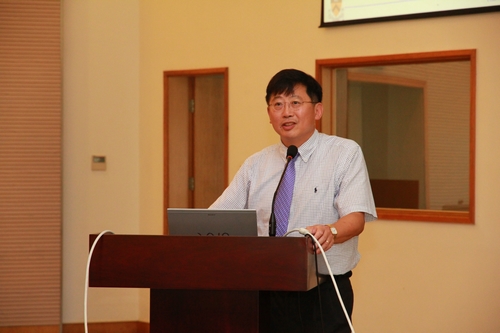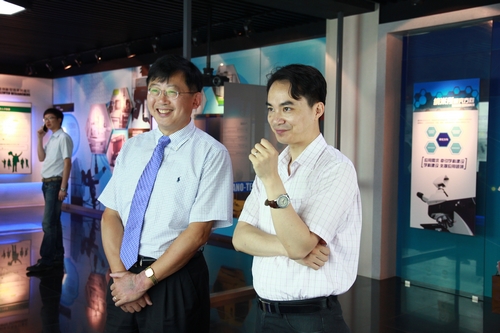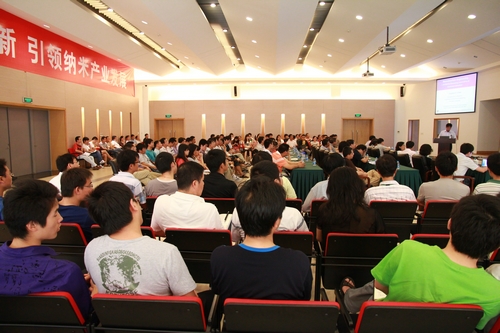On June 22, 2011, Stephen Y. Chou, the National Academy of Engineering (NAE) Member, professor of Princeton University and Einstein Professor of CAS visited Suzhou Institute of Nano-tech & Nano-bionics, CAS.
Accompanied by Prof. CHEN Liwei, the Deputy Director of SINANO, Prof. Chou firstly visited SINANO's exhibition hall and the Printable Electronics Research Center to have a general knowledge about SINANO's research, supporting system and personnel etc. Prof. Chou also expressed his interest in the institute research fields.
Besides, his lecture of "Nanostructure Engineering -- A Path to Discovery, Innovation and Commercialization" was warmly welcomed by over 100 attendees. In the talk, Prof. Chou presented some intriguing phenomena manifested in nanostructures in the areas of electronics, optics, magnetic, biotech and materials, when the device sizes are smaller than the electron wavelength, optical wavelength, magnetic domain wall size, DNA persistent length, single-crystal critical size, and defect diffusion length. Moreover, the talk also addressed a grand challenge essential to the success of nanotechnology and its commercialization: nanomanufacturing -- high-throughput and low-cost nanopatternings.
About Stephen Y. Chou
Stephen Y. Chou, the NAE Member is Joseph C. Elgin Professor of Engineering and the head of the NanoStructure Laboratory at Princeton University. As an Einstein Professor of CAS, he is a world leader, pioneer, and inventor in a broad range of nanotechnologies.
Prof. Chou's pioneering research and inventions in a broad spectrum of nanotechnologies and nanodevices has helped shape new paths in the fields of nanofabrication, nanoscale electronics, optoelectronics, magnetics, and materials. Dr. Chou's graduate work used X-ray lithography to scale MOSFETs to the 60 nm range, and since 1985 he has demonstrated various ultra-small MOSFETs, quantum devices, and single electron transistors. In early 1990's, he began pioneering work in exploring sub-wavelength optical elements (SOEs) and bringing nanofabrication into magnetic data storage media. He originated quantized magnetic disks (QMDs), a new paradigm in magnetic data storage in 1993. In 1995, he pioneered his best-known work, nanoimprint lithography (NIL), a revolutionary nanoscale patterning method that allows sub-10 nm patterning over large areas with high throughput and low cost. He is also a key inventor of lithographically induced self-assembly (LISA) and laser-assisted direct imprint (LADI) and applications of NIL, LISA and LADI in a wide range of disciplines, from electronics and optics to magnetics, biotech, and materials. Since 1999, he has been applying unique and extensive expertise in nanofabrication, nanoelectronics, nanooptics, nanomagnetics and nanomaterials to biology for developing innovative biological manipulators, separators, detectors and analyzers for DNAs, proteins and cells.
Prof. Chou was elected to the National Academy of Engineering in 2007 and received the 2004 IEEE Brunetti Award for the invention and development of tools for nanoscale patterning, especially nanoimprint lithography, and for the scaling of devices into new physical regimes. Other awards he received include an Inductee of New Jersey High Technology Hall of Fame, Pioneer Award of Nanoimprint and Nanoprint Technology, the Joseph C. Elgin Professorship, the McKnight-Land Grant Professorship, the George Taylor Distinguished Research Award at the University of Minnesota, DARPA ULTRA program Significant Technical Achievement Award, and three best paper awards. Dr. Chou has published more than 280 papers, has given over 100 invited presentations at conferences and workshops, and holds 15 patents and over 40 patent applications.
 |
|
Stephen Y. Chou in the Lecture Photo by SINANO |
 |
|
Stephen Y. Chou in SINANO's Exhibition Hall Photo by SINANO |
 |
|
Attendees in Chou's Lecture Photo by SINANO |
downloadFile
